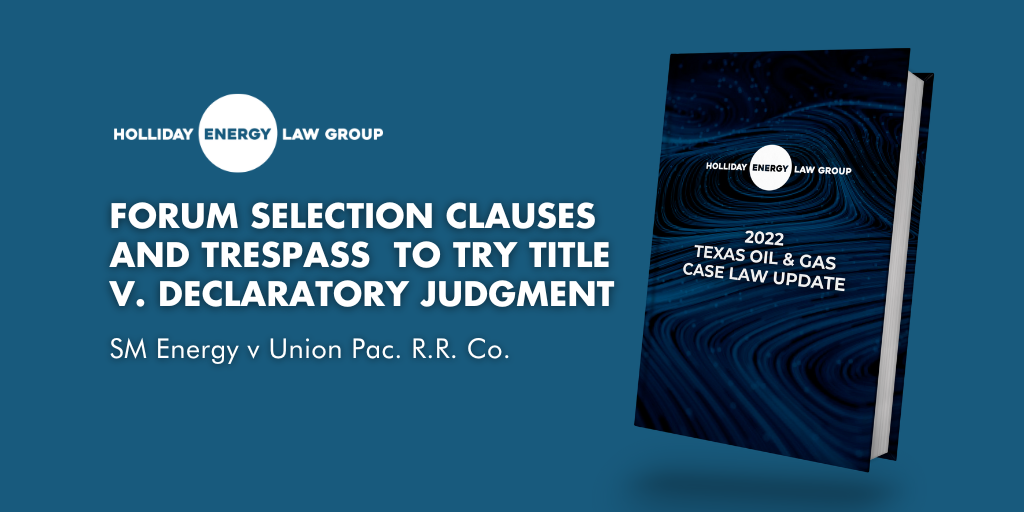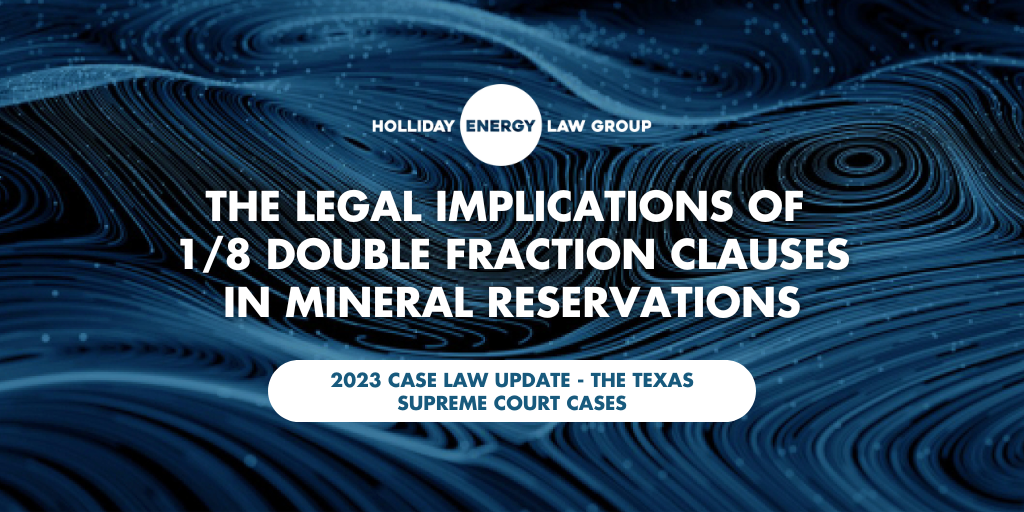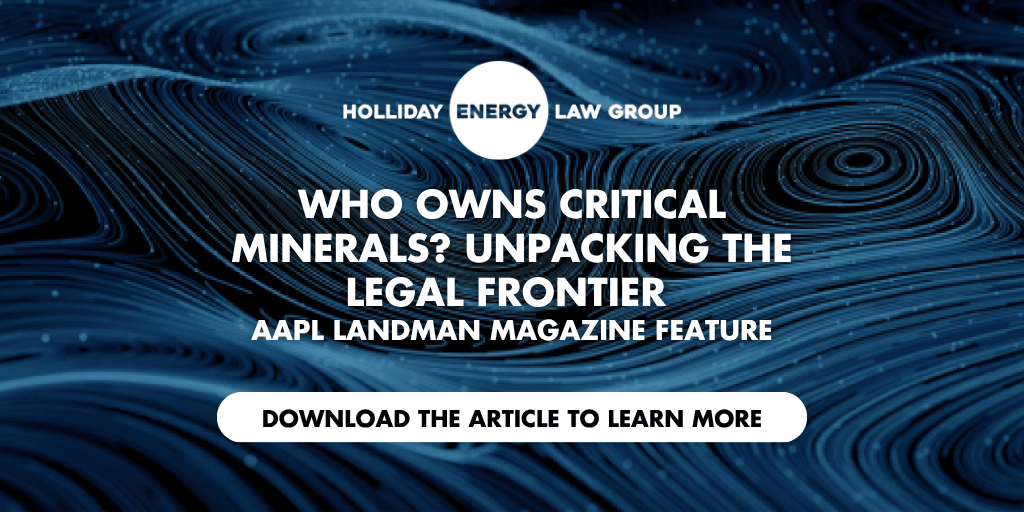Forum Selection Clauses and Trespass to Try Title v. Declaratory Judgment

In SM Energy v Union Pac. R.R. Co., the Texas Court of Appeals for Eastland held that SM Energy’s cause of action constituted a claim for declaratory judgment rather than trespass-to-try-title. Additionally, the court held that Texas courts did not have exclusive jurisdiction over the claims and allowed enforcement of the lease’s forum selection clause.
Key Takeaways
- 1Enforcement of a forum-selection clause cannot be avoided by artfully pleading claims. When determining lease provisions that secondarily affected possession of a leasehold, the court rejected the claimant’s artful contention that its claim was for trespass-to-try-title instead of for declaratory judgment.
- Pursuant to statutory rules of venue by agreement, courts may look to documents related to an oil and gas lease to determine whether the transaction crosses the $1 million threshold of a “major transaction.”
- Procedurally, forum selection clauses are enforced through a motion to dismiss.
Origin of the Dispute
SM Energy (Lessee) and Union Pacific Railroad (Lessor) were parties to three oil and gas leases covering lands in Howard County, Texas. Each lease was “paid up” and contained a forum-selection clause providing that “[v]enue of all disputes arising out of or relating to this lease shall be exclusively in Omaha, Nebraska and no other place.”
In addition, each lease contained a most-favored-nations (“MFN”) clause, which provided:
Favored Nations. If Lessee pays a larger bonus per net mineral acre for any lease within a one (1) mile radius of the premises within three (3) years of the effective date of this Lease… then Lessor will be entitled to the greater bonus or royalty, as the case may be, which Lessee hereby agrees to pay.
Furthermore, if SM Energy violated the MFN clause, it must pay Union Pacific $5.00 dollars per net mineral acre per day covered by each lease wherein Union Pacific received a lesser bonus or royalty. The leases also provided that if SM Energy breached any portion of the lease, Union Pacific “shall notify Lessee by certified mail of such breach, and Lessee shall have 30 days from the receipt thereof to comply with this Lease. If Lessee fails to remedy a breach within such period, Lessor may, at its option, terminate the Lease.”
On July 17, 2020, Union Pacific’s legal counsel sent SM Energy a letter stating that two subsequent leases on neighboring lands were in violation of the MFN clause. Union Pacific requested that SM Energy pay all liquidated damages within 30 days of the letter, which it failed to timely pay.
On August 27, 2020, Union Pacific’s legal counsel sent SM Energy another certified letter, again informing SM Energy of the alleged lease breaches. SM Energy responded with a list of leases that SM Energy had identified as violating the MFN clause, and also offered to pay Union Pacific $3,073,592.38. Union Pacific rejected the offer, which excluded liquidated damages. On September 11, 2020, SM Energy sent Union Pacific a check for the amount previously offered, which Union Pacific again rejected and destroyed.
On September 29, 2020, Union Pacific informed SM Energy of its failure to cure the breach within the 30-day timeframe allotted under the lease. Then, on October 8, 2020, SM Energy e-mailed an updated list of leases in breach of the MFN clause to Union Pacific. SM Energy again sent a check to Union Pacific, this time for $3,181,620, which accounted for the additional bonuses owed. Union Pacific accepted this check, but maintained that SM owed it an additional $5,243,502.40 in liquidated damages.
SM Energy filed its original petition in Howard County on January 7, 2021, asserting leasehold estate ownership and that Union Pacific had unlawfully dispossessed SM Energy of its right to possession. Union Pacific responded to SM Energy’s petition with a motion to dismiss for improper venue. In the motion, Union Pacific asserted that Omaha, Nebraska, is the proper forum to litigate SM Energy’s claim.
The trial court granted Union Pacific’s motion to dismiss. After the dismissal, SM Energy requested that the trial court file findings of facts and conclusions of law. The trial court denied SM Energy’s request and this appeal followed.
The Appeal
On appeal, SM Energy argued three issues. First, the trial court erred in enforcing the forum-selection clause. In support of this position, SM Energy asserted that enforcement of the forum-selection clause was unreasonable and unjust because Nebraska courts lack subject-matter jurisdiction over the claims. Specifically, SM Energy argued that Nebraska courts lack the requisite jurisdiction to decide real property disputes surrounding Texas or any land in other states. Second, SM Energy claimed that enforcing the forum-selection clause would result in piecemeal litigation. And third, SM Energy asserted that enforcing the forum-selection clause would contravene Texas’s strong public policy for adjudicating title disputes where the real property is located.
The court of appeals declared that SM Energy’s first and third issue turn on the same question, whether SM Energy’s claim is properly classified as a trespass-to-try-title action. Accordingly, the court addressed SM Energy’s first and third contentions together.
Artful Pleading
SM Energy argued that it had asserted a trespass-to-try-title action that can only be litigated in Texas. In support of its argument, SM Energy emphasized that “Texas courts have no subject matter jurisdiction to adjudicate title to realty, including interests in oil and gas leases, in another state.” SM Energy essentially asserted a corollary to that rule – that is, Texas courts should have the exclusive subject-matter jurisdiction to adjudicate title to realty in the form of an oil and gas lease covering lands in Texas.
In response, Union Pacific argued that SM Energy’s claim is not one to recover real property, but rather it is a claim in the nature of declaratory judgment. Union Pacific turned to Devon Energy, noting that “a Texas court with jurisdiction over the parties may enforce a party’s personal or contractual obligation that indirectly involves property in another state.” In turn, Union Pacific also argued a corollary to that rule – that is, a Nebraska court would have jurisdiction to adjudicate the parties’ contractual obligations under the oil and gas leases.
A party seeking to avoid enforcement of a forum selection clause must clearly show: “(1) enforcement would be unreasonable or unjust, (2) the clause is invalid for reasons of fraud or overreaching, (3) enforcement would contravene a strong public policy of the forum where the suit was brought, or (4) the selected forum would be seriously inconvenient for trial.” The court of appeals began its analysis by noting that declaratory judgments and trespass-to-title actions are both statutory creatures. The court turned to Section 22.001 of the Texas Property Code, which provides: “A trespass to try title action is the method of determining title to lands, tenements, or other real property.” Under this statute, the prevailing party’s remedy is title to, and possession of, the real property at issue.
Conversely, Section 37.004 of the Texas Civil Practice and Remedies Code provides that a person with rights under a deed, contract, or instrument “may have determined any question of construction or validity arising under the instrument … and obtain a declaration of rights, status, or other legal relations thereunder.”
The court held that the trespass-to-try-title statute will only cover a claim if the plaintiff “is seeking to establish or obtain the claimant’s ownership or possessory right in the land at issue.” Conversely, a declaratory judgment “provides an efficient vehicle for parties to seek a declaration of rights under certain circumstances.” After distinguishing a trespass-to-try-title claim from a declaratory judgment claim, the court emphasized that a claimant may not avoid a forum-selection clause by artfully pleading their claim.
Accordingly, the court looked to SM Energy’s original petition and noted that although SM Energy addressed elements of a trespass-to-try-title action, the substance of the petition revealed that SM Energy really asserted a claim for a declaratory judgment to determine the obligations SM Energy owed to Union Pacific. Specifically, the court noted that SM Energy’s claims of dispossession are dependent on an initial determination that the liquidated damages provision contained in each of the three leases is unenforceable. That is, the issue of dispossession is secondary to the determination of whether SM Energy breached the lease and to the validity of the liquidated damages provision. As such, SM Energy’s title was only prospectively implicated.
Piecemeal Litigation
On its second issue, SM Energy argued that enforcement of the forum-selection clause would violate Texas’s public policy against piecemeal litigation. The court pushed back and noted that the single action rule is a species of res judicata that prevents claimants from asserting subsequent claims in separate actions that could have been brought in the original action. The court explained that enforcement of the forum-selection clause would not violate Texas’s public policy against piecemeal litigation from the perspective of the claimant. The court held that “[f]or all intents and purposes, the claimant in this dispute is Union Pacific because it is the party asserting that SM Energy breached the oil and gas leases.”
Major Transactions
For its last issue, SM Energy argued that the trial court erred in finding that Nebraska was the proper forum to litigate this dispute under Section 15.020 of the Texas Civil Practice and Remedies Code. Specifically, SM Energy argued that the 640-acre lease does not meet the requirements of a “major transaction.”
In relevant part, Section 15.020 provides that “an action arising from a major transaction shall be brought in a county if the party against whom the action is brought has agreed in writing that a suit arising from that transaction may be brought in that county.” A “major transaction” is defined as “a transaction evidenced by a written agreement under which a person pays or receives, or is obligated to pay or entitle to receive, consideration with an aggregate stated value equal to or greater than $1 million.”
SM Energy argued that the 640-acre lease, on its face, fails to state consideration exceeding $1 million. The court rejected SM’s argument, pointing to other related documents that showed evidence of a major transaction. Namely, one week after the parties executed the 640-acre lease, Union Pacific provided SM Energy’s predecessor-in-interest a wire transfer confirmation indicating that the original lessee paid Union Pacific a lease bonus of $2.4 million.
Here, the court noted that SM Energy’s argument is irrelevant and contrary to the general rule “that separate instruments or contracts executed at the same time, for the same purpose, and in the same course of the same transaction are to be considered one instrument, and are to be read and construed together.” The court acknowledged that the transfer was not delivered on the same day the lease was executed, but concluded that other factors, such as the property description, connected the transfer to the lease. The court also found it telling that the lease was a “paid up” lease. In the court’s view, the bonus of $2.4 million represented the consideration paid by the original lessee to Union Pacific.
On these facts, the court overruled all of SM Energy’s issues and affirmed the order of the trial court. Once again, the validity of the forum-selection clause giving Nebraska jurisdiction to litigate the claim was upheld.
For a more detailed insight into the 2022 Texas Oil & Gas Case Law Update, download the HELG paper.


